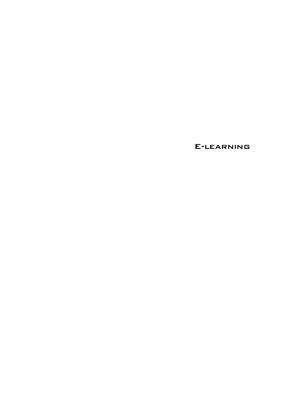Издательство InTech, 2010, -320 pp.
ELeaing is a vast and complex research topic that poses many challenges in every aspect: educational and pedagogical strategies and techniques and the tools for achieving them; usability, accessibility and user interface design; knowledge sharing and collaborative environments; technologies, architectures, and protocols; user activity monitoring, assessment and evaluation; experiences, case studies and more.
This book’s authors come from all over the world; their ideas, studies, findings and experiences are a valuable contribution to enriching our knowledge in the field of eLeaing. The book consists of 18 chapters divided into three sections. The first chapters cover architectures and environments for eLeaing, the second part of the book presents research on user interaction and technologies for building usable eLeaing environments, which are the basis for realizing educational and pedagogical aims, and the last part illustrates applications, laboratories, and experiences.
E-leaing for the new generations, a Web 2.0 approach
Developing and Implementing a Multi-Agent System for Collaborative E-leaing
Distributed E-leaing Based on SOA
Regionally Distributed Architecture for Dynamic e-Leaing Environment (RDADeLE)
Dynamic analysis of activity of e-leaing system users
An Approach in Personalisation and Privacy in E-Leaing Systems
Affective Computing in E-leaing
Empathic Multiple Tutoring Agents for Multiple Leaer Interface
Avatar Augmented Annotation Interface for e-Leaing
Developing screencasts and video screencasts for e-leaing
Distance Leaing: New Opportunities for the Blind
Conception of Lesson Notes as Cartoon for Foreign Language Leaing
Virtual collaborative leaing environments with the Telepresence Platform supported by the Teaching for Understanding pedagogical framework: experiences in Higher Educational process in Colombia
E-Leaing Tool for Digital Design and Embedded System Training
Remote Control of a Multi-robot Infrastructure for E-Leaing Training Sessions
Development Sensor Experimental Platform Based on the Graphical Monitoring and Control System
Virtual and Remote Laboratories for E-Leaing Using EDA Tools
Development of A Distance Microprocessor-based Platform using Graphical Interface via the Inteet
ELeaing is a vast and complex research topic that poses many challenges in every aspect: educational and pedagogical strategies and techniques and the tools for achieving them; usability, accessibility and user interface design; knowledge sharing and collaborative environments; technologies, architectures, and protocols; user activity monitoring, assessment and evaluation; experiences, case studies and more.
This book’s authors come from all over the world; their ideas, studies, findings and experiences are a valuable contribution to enriching our knowledge in the field of eLeaing. The book consists of 18 chapters divided into three sections. The first chapters cover architectures and environments for eLeaing, the second part of the book presents research on user interaction and technologies for building usable eLeaing environments, which are the basis for realizing educational and pedagogical aims, and the last part illustrates applications, laboratories, and experiences.
E-leaing for the new generations, a Web 2.0 approach
Developing and Implementing a Multi-Agent System for Collaborative E-leaing
Distributed E-leaing Based on SOA
Regionally Distributed Architecture for Dynamic e-Leaing Environment (RDADeLE)
Dynamic analysis of activity of e-leaing system users
An Approach in Personalisation and Privacy in E-Leaing Systems
Affective Computing in E-leaing
Empathic Multiple Tutoring Agents for Multiple Leaer Interface
Avatar Augmented Annotation Interface for e-Leaing
Developing screencasts and video screencasts for e-leaing
Distance Leaing: New Opportunities for the Blind
Conception of Lesson Notes as Cartoon for Foreign Language Leaing
Virtual collaborative leaing environments with the Telepresence Platform supported by the Teaching for Understanding pedagogical framework: experiences in Higher Educational process in Colombia
E-Leaing Tool for Digital Design and Embedded System Training
Remote Control of a Multi-robot Infrastructure for E-Leaing Training Sessions
Development Sensor Experimental Platform Based on the Graphical Monitoring and Control System
Virtual and Remote Laboratories for E-Leaing Using EDA Tools
Development of A Distance Microprocessor-based Platform using Graphical Interface via the Inteet

